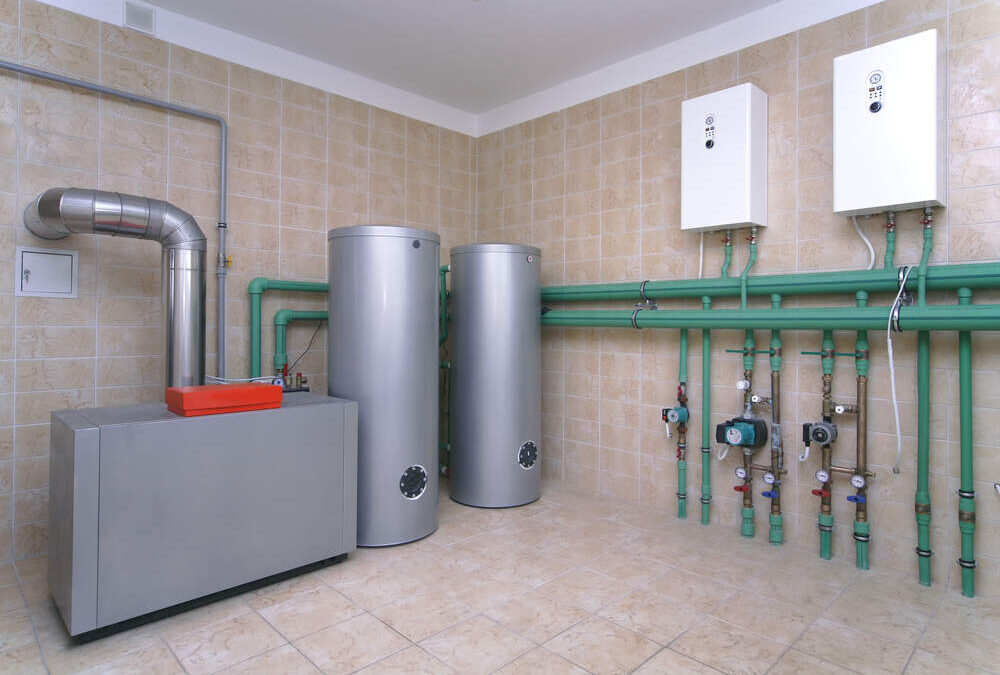“Green” home appliance solutions continue to grow in popularity, from solar water heaters to high-efficiency furnaces that can produce more heat for every unit of fuel they burn. Not everyone can install solar panels, however, and your heating needs may not be large enough to justify opting for a high-efficiency furnace. Even improved electric and gas water heaters have additional utility costs associated with their use. What if there was a way you could equip your home with heat and hot water at a virtually negligible cost? It’s possible! With a geothermal heat pump system, you could enjoy these amenities at a cost so low over time it will seem free.
While most people think of geothermal systems as requiring a very deep installation to be able to tap into warmth locked far underground, that isn’t true. In reality, modern geothermal systems do not require as much land area and don’t need to be buried as deeply due to improvements in efficiency and the underlying technology. They can even find uses in commercial applications. How can you harness the power of the sun to keep your home a comfortable space during the colder months, all without expanding your environmental footprint any further?
How Geothermal Heating Works to Warm Your Home
 The ground makes for an excellent heat sink, especially the farther down you go. At a certain depth, no more than about 10 feet below the surface, the soil temperature levels off and remains relatively stable. This place is chosen for geothermal heat pump loops, as it provides the best medium for temperature exchange. During warm periods of the year, this heat pump can take heat from inside your home and allow the ground to absorb it, providing a cooling mechanism for an air conditioner.
The ground makes for an excellent heat sink, especially the farther down you go. At a certain depth, no more than about 10 feet below the surface, the soil temperature levels off and remains relatively stable. This place is chosen for geothermal heat pump loops, as it provides the best medium for temperature exchange. During warm periods of the year, this heat pump can take heat from inside your home and allow the ground to absorb it, providing a cooling mechanism for an air conditioner.
How could the ground be warm enough to heat your home, though? As the sun shines during the day, the ground absorbs a great deal of warmth and only surrenders it very slowly. The same cooling system can extract this heat out of the ground, bringing it indoors to heat your home effectively even when it’s a bit chilly outside. Because the mechanics of soil heating are the same virtually everywhere, geothermal systems can be an appropriate choice for almost any homeowner.
Can Geothermal Heating Actually Give You Hot Water?
Yes, you can enjoy a hot shower or wash some dishes solely by using a geothermal heat pump system. However, this time you aren’t extracting the heat from the ground outside, but from the mechanical components of the system itself. Like any HVAC equipment, a geothermal loop requires a compressor to circulate the heat exchange liquid through the loop. During operation, this compressor can expel a great deal of heat — heat that would typically go to waste, released to the outdoors.
A piece of technology called a “desuperheater” is the solution to providing an even greener option for hot water at home. The desuperheater is another loop that brings water from the heating tank into proximity with the compressor. The water heats up rapidly from the waste heat and returns to the tank, ready for use. Desuperheaters work whether your geothermal system is in heating or cooling mode. The result is an incredible increase in efficiency, delivering hot water at a far lower cost than a traditional gas or electric heater.

Is It Really Free?
As they say, “there’s no such thing as a free lunch.” There are still some costs associated with operating geothermal systems, but they are a fraction of what you might pay with a more traditional setup. You will still need some electrical power to run the compressor for your geothermal heat pump, for example. Likewise, when your system isn’t running, the desuperheater can’t produce any more hot water for the home; you’ll need a supplemental fuel source. Unless you have an expansive solar installation for your home that can provide all the power necessary for these systems off-grid, you’ll still need to plan to pay something. There are maintenance costs to consider too. Even so, the savings you’ll experience by transitioning to a geothermal system are substantial after the system pays for itself.
Learn More About Adding a Geothermal Heat Pump System to Your Home
Though you’ll still need to pay your water bill and there may be occasions when you need to supplement your system with more traditional solutions, a geothermal heat pump system can prove to be an economic investment. When you factor in your energy savings over time, it’s easy to determine how quickly a geothermal setup will pay for itself. Add in the intangible contributions you make to helping safeguard the environment, and the practically “free” nature of your home heating looks even better. To explore these solutions and whether they’re suitable for your property, be sure to identify and reach out to discuss your interest with a qualified HVAC contractor today.

